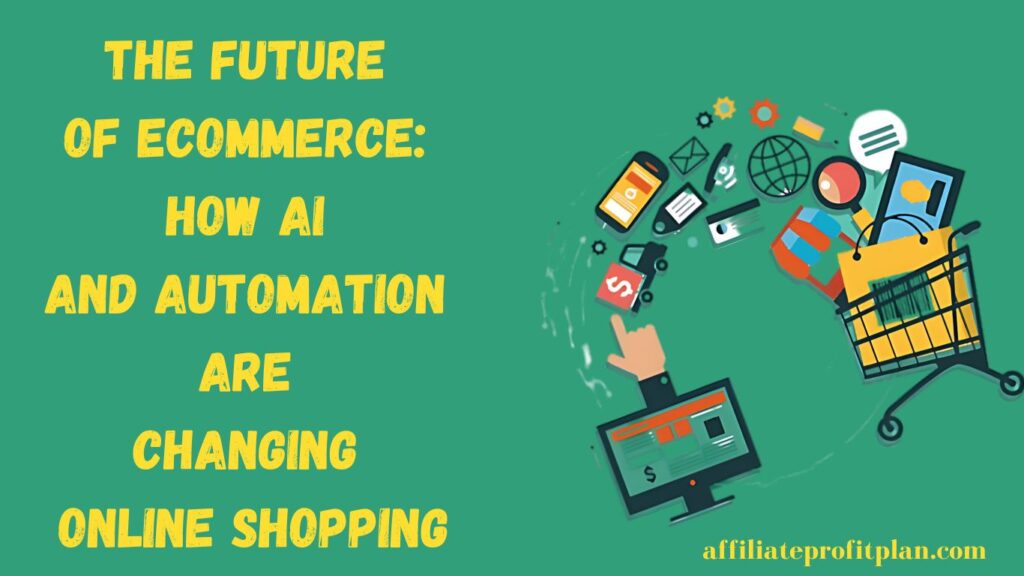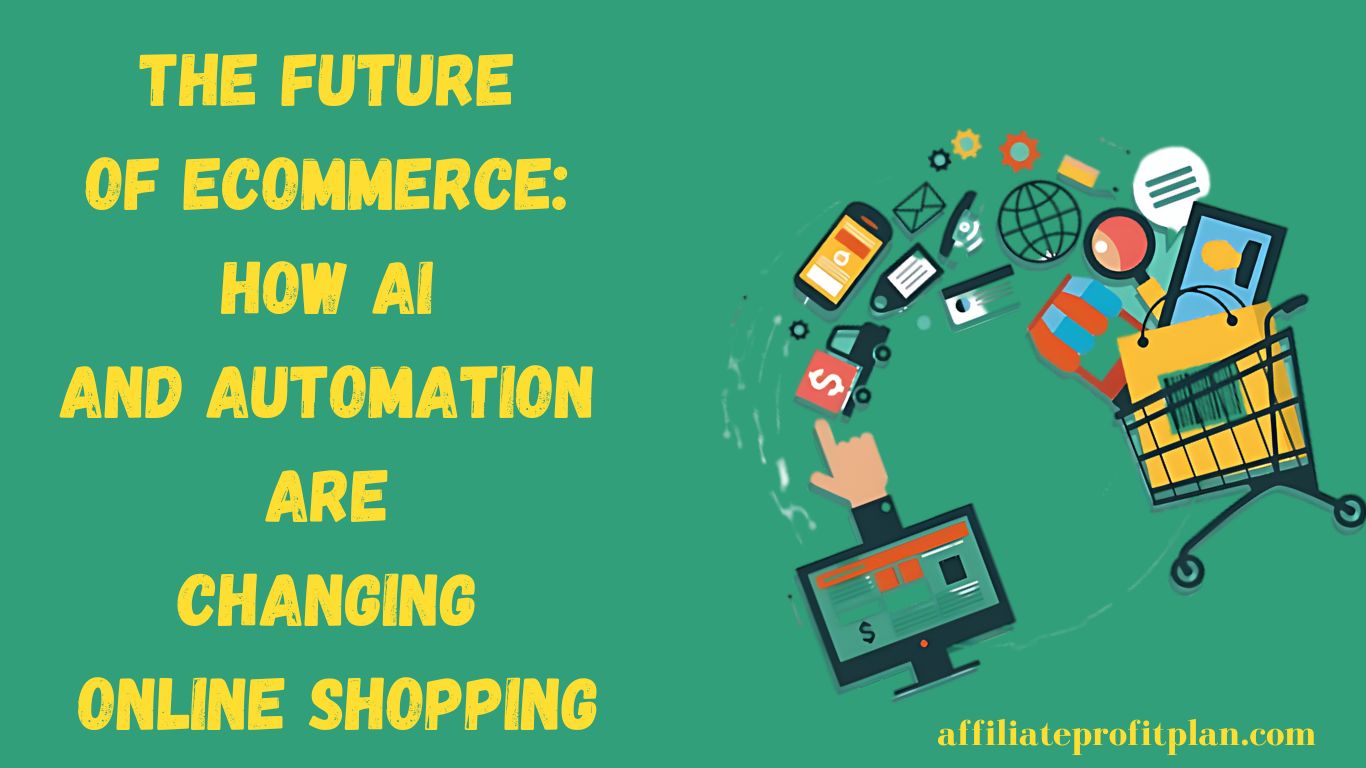Welcome to my article The Future of Ecommerce: How AI and Automation Are Changing Online Shopping. The world of ecommerce is no stranger to rapid change, but lately, things have shifted into high gear. If you blink, you might miss the latest advancement in artificial intelligence (AI) or automation reshaping the way we shop online. Remember the days when a chatbot was just a glorified FAQ section? Now, thanks to AI, they’re practically human—minus the bad jokes and coffee breaks. From personalized shopping experiences that feel like your favorite store clerk knows you better than your best friend, to warehouses where robots are out-hustling human workers (and probably judging us for being slow), AI and automation are turning ecommerce into something straight out of a sci-fi movie.
But what does all of this mean for you, the online shopper or ecommerce entrepreneur? Well, for starters, it means faster, smarter, and more secure shopping experiences. AI is doing everything from recommending products based on your scrolling habits (yes, it knows you’ve been eyeing that coffee maker for three days) to preventing cyber crooks from swiping your card info. Meanwhile, automation is ensuring your order gets to your doorstep at lightning speed, with barely a human hand involved. In this article, we’ll take a closer look at how these technologies are transforming ecommerce—and why you should be excited (and maybe a little bit cautious) about the future of online shopping.
Access My Proven Blueprint for $50-$100 Daily Income – Watch This FREE Video Now >>>

Personalized Shopping Experiences Powered by AI
If you’ve ever wondered how that perfect pair of shoes ended up in your cart when all you searched for was “socks,” you can thank artificial intelligence. AI has become the behind-the-scenes shopping assistant we never asked for but can’t live without. It’s like a personal shopper, minus the awkward small talk and judgmental stares. Through advanced algorithms, AI analyzes your browsing habits, purchase history, and even the items you hover over a bit too long, all to serve up recommendations that feel eerily spot-on.
Remember the days when shopping was a one-size-fits-all ordeal? You’d browse through hundreds of items just hoping something would catch your eye. Now, AI does all the heavy lifting—sifting through vast product catalogs in milliseconds to present you with exactly what you’re looking for (or what it thinks you should be looking for). It’s like walking into a store and the clerk immediately hands you everything you didn’t know you needed. Sure, it might be a little creepy that the algorithm knows you want a new blender before you do, but hey, it’s convenient!
For businesses, this AI-powered personalization isn’t just about impressing customers—it’s about driving sales. When shoppers are served highly relevant products, they’re much more likely to hit “Buy Now” rather than continue scrolling. It’s no wonder big names like Amazon and Netflix are masters at using AI to personalize your experience, making sure you never leave their platforms without at least something in your cart (or queue). In the end, AI might just know our shopping preferences better than we do—let’s just hope it doesn’t start picking out our outfits too!
AI-Driven Chatbots and Virtual Assistants for Customer Support
Gone are the days of waiting on hold for customer support, listening to elevator music that somehow makes your issue feel even more urgent. Enter AI-driven chatbots and virtual assistants—the customer service reps that never sleep, don’t need lunch breaks, and (thankfully) never ask to “speak to a manager.” These digital helpers are taking over customer support in the ecommerce world, and, honestly, they’re doing a pretty good job. Not only can they answer questions faster than a human can say “How can I help you?”, but they’re also available 24/7—because nothing says modern convenience like getting help with a return at 3 a.m.
So how do these AI-powered assistants work their magic? Well, it’s not actual magic (though it can feel like it). AI chatbots are trained to handle a wide range of customer queries by learning from vast amounts of data. They can quickly provide answers to frequently asked questions, process orders, track shipments, and even troubleshoot basic tech issues without ever needing to “please hold.” And if they hit a wall with a particularly tricky question, they can seamlessly hand you off to a human agent—without that awkward “I have no idea what you’re talking about” moment.
For ecommerce businesses, these chatbots are a game-changer. They significantly reduce customer service costs while speeding up response times, leading to happier customers. Plus, AI virtual assistants aren’t just reactive—they’re proactive. Some are designed to nudge customers toward a sale with personalized product suggestions or offer help when they sense a shopper is stuck. They’re like the helpful store clerk who somehow knows exactly when you need help, but without the hard sell. And let’s be honest—who wouldn’t prefer a helpful AI that doesn’t judge your midnight impulse buys?
Automation in Order Fulfillment and Inventory Management
If you’ve ever marveled at how your online order showed up on your doorstep faster than it takes to microwave dinner, you’ve witnessed the power of automation in ecommerce. Behind the scenes, robots are whizzing around warehouses, picking, packing, and shipping your items with the precision of a Tetris master. No more misplaced packages or “sorry, we’re out of stock” disappointments—automation is handling it all with an efficiency that makes humans look, well, a little slow.
Access My Proven Blueprint for $50-$100 Daily Income – Watch This FREE Video Now >>>
In today’s ecommerce world, automation has become the backbone of order fulfillment and inventory management. Let’s face it, manually tracking thousands of products and ensuring they’re delivered on time is about as practical as herding cats. Enter robots, conveyor belts, and AI-powered systems that know exactly what’s in stock, where it’s located, and how to get it to your doorstep in record time. With automated warehouses, companies like Amazon can process orders in minutes, not hours, making next-day or even same-day delivery the new normal. And don’t worry—these robots won’t complain about working the night shift or ask for overtime pay.
But it’s not just about speed. Automation reduces human error, which means fewer mix-ups like receiving a pair of socks when you ordered a blender. Automated inventory management systems use real-time data to keep track of stock levels, predict demand, and even reorder items when supplies get low—so you won’t be stuck waiting for a restock of that bestseller everyone else is trying to buy too. It’s like having a super-organized stockroom manager who never forgets a thing.
For businesses, this efficiency translates into major cost savings, faster delivery times, and happier customers. And for consumers? Well, it means you can keep clicking “add to cart” with the confidence that your order will be on its way before you’ve even thought about what you’re going to cook for dinner.
AI-Powered Marketing and Ad Targeting
Remember the days when ads felt like random pop-ups, trying to sell you everything from lawnmowers to kitchen blenders—when all you really wanted was a pair of sneakers? Well, those days are long gone, thanks to AI-powered marketing. Now, it’s like the internet knows you better than your closest friends. AI takes a deep dive into your browsing habits, past purchases, and even those innocent late-night scrolls through social media to deliver hyper-targeted ads that somehow hit the mark every time. It’s like magic, but with data—lots and lots of data.
AI-powered marketing is revolutionizing how ecommerce businesses reach customers. Instead of casting a wide net and hoping something sticks, AI uses predictive analytics to figure out exactly who’s interested in what. It can analyze huge amounts of data faster than any human marketer could dream of, spotting patterns and predicting what you might want next (yes, even before you know it yourself). So, when you’re browsing online and that ad for the perfect vacation spot appears, you can thank (or blame) AI for reading your mind—or at least your search history.
But the magic doesn’t stop at ads. AI is also getting smart about email marketing, sending you personalized messages with products that align perfectly with your tastes and needs. It’s like that one friend who always gives great gift recommendations, but without the pressure of reciprocating. Businesses love it because AI-powered marketing means higher ROI—why waste money on ads no one cares about when you can target only the people who are likely to buy? And let’s be honest, if we’re going to get bombarded with ads anyway, they might as well be for things we actually want, right?
So, next time you click on an ad that feels suspiciously well-timed, remember: AI didn’t just take a lucky guess. It’s been quietly gathering data to make sure that product you didn’t know you needed is only one click away from your cart. Creepy? Maybe a little. Effective? Definitely.
The Role of AI in Fraud Detection and Security
While AI is busy making your shopping experience more personalized and your ads more relevant, it’s also doing something even more important—keeping your money safe. In a world where cybercriminals are getting craftier by the minute, AI has become the unsung hero of ecommerce fraud detection. Think of it as the ultimate digital bodyguard, constantly scanning transactions, looking for anything fishy, and making sure nobody’s swiping your card info while you’re trying to buy those new sneakers.
Here’s how it works: AI systems are trained to recognize patterns in data—whether it’s your spending habits or typical transaction behaviors. If something looks off, like an order for ten iPhones when you usually buy, say, groceries, AI sounds the alarm. It’s like that friend who notices when you start acting out of character, except this friend is powered by machine learning and doesn’t need to sleep. The best part? It does all this in real-time. So while you’re peacefully shopping, AI is running in the background, stopping potential fraudsters in their tracks before they can even hit “checkout.”
For ecommerce businesses, AI-powered fraud detection is a game-changer. Without it, manual checks would be about as effective as trying to find a needle in a haystack—slow, painful, and not exactly scalable. AI, on the other hand, can sift through millions of transactions in seconds, spotting anomalies that even the most seasoned human eye might miss. Whether it’s detecting unusual login locations, abnormal purchase amounts, or too many failed payment attempts, AI has its digital detective hat on at all times.
And it’s not just about stopping fraudsters after they’ve struck. AI can also predict and prevent attacks before they happen, using algorithms to anticipate the latest tactics and trends in cybercrime. This proactive approach means ecommerce businesses can protect both themselves and their customers from financial loss. So, while you’re happily scrolling through deals, AI is working overtime to make sure that the only thing breaking your bank is your online shopping habit—not some cybercriminal trying to hack your account.
In short, AI is the ultimate multitasker—it’s not only making your ecommerce experience smoother and faster, but it’s also guarding your sensitive information like a high-tech bouncer at the club of online shopping. Who knew your favorite shopping buddy was also a security expert?
Conclusion
As we peer into the crystal ball of ecommerce, one thing is clear: AI and automation are not just futuristic concepts, they’re here, and they’re reshaping the way we shop. From personalized recommendations that somehow always know what we want (even when we don’t) to virtual assistants that never get tired of answering our questions, the influence of AI is undeniable. And let’s not forget the robots quietly running the show in warehouses, ensuring your package arrives faster than you can say “add to cart.”
Access My Proven Blueprint for $50-$100 Daily Income – Watch This FREE Video Now >>>
But it’s not just about convenience. AI and automation are making the online shopping experience smarter, safer, and more efficient. They’re improving customer support, optimizing inventory management, and even playing the role of cyber bodyguards, ensuring your hard-earned money is safe from fraudsters. Sure, it might feel a little like we’re living in a sci-fi movie where algorithms know our preferences better than we do, but hey—if it makes shopping easier, we’ll take it.
So, what’s next for the future of ecommerce? As AI continues to evolve, we can expect even more seamless and innovative shopping experiences. Who knows, maybe one day we’ll have virtual reality fitting rooms and AI-powered fashion consultants picking out our outfits. Until then, we can sit back, relax, and let AI do what it does best—making sure we never have to settle for subpar customer service or late deliveries again. Here’s to a future where shopping is as effortless as clicking a button, with a little help from our robot friends.
Thanks a lot for reading my article on “The Future of Ecommerce: How AI and Automation Are Changing Online Shopping” till the end. Hope you’ve helped. See you with another article.










